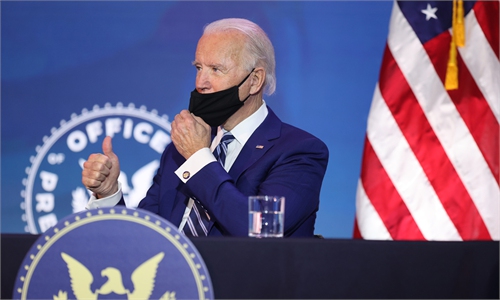
Photo: Courtesy of Zheng Yongnian
Editor's Note:
The US Electoral College has formalized the election of Joe Biden for the final tallying and approval by the US Congress on January 6, 2021. In this period of transition, voices are urgently asking what might become of the China-US relationship once Biden takes office. Will the world's two largest economies recover their ties? Reset them in certain spheres? Will the West further intensify its aggressive anti-China campaign? Zheng Yongnian (Zheng), Presidential Chair Professor, Director of The Advanced Institute of Global and Contemporary China Studies, The Chinese University of Hong Kong (Shenzhen), shared his views on these issues with Global Times (GT) reporter Xu Hailin in a telephone interview.
GT: COVID-19 and this year's presidential election have revealed increasingly severe divisions in the US. Some people believe this could mean a window of opportunity for China. What's your take?
Zheng: The epidemic in the US is a crisis. But other countries' crisis does not necessarily equal our opportunity. We should draw a lesson from what the US is undergoing and why US society is so divided. The US benefited from hyper-globalization, but it simultaneously began to have problems in governance and see its society more and more split. The middle class has shrunk sharply in the US along with unbalanced income and wealth distribution. At the same time, US society has become much more unfair. Over 70 percent of Americans were middle class in 1969. This percentage has been shrinking since the 1980s, from nearly 60 percent of households in the late 1970s to a bit more than 51 percent by 2013. This is the root cause of real divisions in the US.
The priority of China should be to draw lessons from it. From the 14th Five-Year Plan (2021-25) and the fifth plenary session of the 19th Central Committee of the Communist Party of China, we can see that China has determined to help more people move into the middle class. This is an important move. We have reached the historical feat of resolving extreme poverty in November. This will be very important to the increase middle-class population. This is what we have learned from the US.
Of course, there will be opportunities for China, but not due to the crises in the US. Although we shouldn't harbor any illusions that the Biden administration will radically change domestic and international attitudes toward China, we still need to grab any opportunity we may have.
In my personal opinion, President Donald Trump made an irrationally tough stance on China. Biden's policies, regardless of how tough some might be toward China, will be rational overall.
Biden will eventually find common ground between China and the US, and thus there will be room for cooperation in areas where China-US collaboration is needed. These include climate change, public health, and prevention of proliferation of nuclear weapons. The China-US cooperation will be needed on issues related to fixing the world order.
In fact, the two countries have a lot of common interests. Trump tried to push "decoupling" between the two and engaged in trade protectionism as well as economic nationalism. But it is evident that such moves have also badly hurt the US itself. This doesn't meet US interests. Trump totally failed to make good on his promise to "Make America Great Again," instead he lost himself by erroneously attacking China.
No one can deny that China and the US are economically interdependent. Any adjustment to the two countries' relationship should be based on this precondition rather than call for decoupling as the Trump administration did. Therefore, we shouldn't have any illusions over Biden on the one hand. We mustn't also let opportunities to improve China-US ties go. Improving ties will benefit not only the two countries, but also the entire world.

People wait to receive food at a food distribution site in the Brooklyn borough of New York, the United States, May 14, 2020. (Photo by Michael Nagle/Xinhua)
GT: So in your opinion, during Biden's tenure, China and the US will restore their relationship, and also be able to restart the engine in some spheres, won't they?
Zheng: They will. Actually, issues like climate change, COVID-19 pandemic, and proliferation of nuclear weapons are problems faced by all humanity and all countries - including the US and China. The Trump administration has ignored some global issues, but Biden, who has been in politics for decades and also served as vice president for years, has a deeper understanding of these issues.
And it bodes well that Biden's picks for his administration have worked with him during the Obama presidency. They have witnessed how the Trump administration pulled China-US ties into stalemate. They know confrontation and antagonism cannot solve the US own problems but instead deteriorate them. Shirking responsibilities onto China's shoulders, such as accusing China for trade problems and the COVID-19 pandemic, as the Trump administration did, is no cure to the US' chronic diseases.
I think the Biden team will have some introspection after seeing what happened to the US over the past four years. They will try to figure out a way that is good for the US. Of course, they won't do anything solely for the good of China as a gift without strings attached. But as they will think rationally, there will be good chances of changes in US policies.
GT: You just mentioned that we shouldn't harbor any illusions over Biden either. Whereas Trump has repeatedly squeezed room for Biden to maneuver, what's your take on Biden's possible China policies? Especially regarding the South China Sea and Taiwan issues?
Zheng: It is getting complicated. Attacking China won't solve any of the US's domestic problems. It will only worsen it. But if China-US ties can be handled with reasonable hands, it might somehow be a relief to the US. After all, China is a growing consumer market with an increasingly large capacity. The US remains to be a big manufacturer. The Chinese market is indispensable to the US. Losing this market adds insult to US injury.
Disputes such as trade deficits can be addressed, but not with a trade war - it is too irrational and obviously not the most effective choice. We can find more feasible ways out.
Besides, Trump has left very bad legacies to Biden. These will be a constraint. The problem is that Trump has motivated China hawks in the US who will not go "poof" and magically disappear when Biden is sworn in. They will linger and antagonize. From this perspective, before the new president officially assumes power, China and the US are more likely to be engaged in crisis management.
Regardless of US policies on the South China Sea and Taiwan, China should take a hands on initiative. These are mainly China's issue and questions, not the US'. Washington will make troubles over them though. It is impossible for the US to do anything conducive to cross-Straits reunification or for peace in the South China Sea. But China is capable of handling these matters judiciously.
The South China Sea issue is mainly about the China-ASEAN relationship. We are pushing forward talks over the Code of Conduct, and we have signed the Regional Comprehensive Economic Partnership with ASEAN and some other countries. President Xi Jinping has said that China will give positive considerations to the idea of joining the Comprehensive and Progressive Agreement for Trans-Pacific Partnership. We can see that comprehensive ties between China and ASEAN are moving forward. In the meantime, ASEAN members have realized that simply taking sides with the US won't solve problems because China is an indispensable internal factor to the bloc's development. These show positive signs.
The Taiwan question is the core interest of China. So China won't concede over it. No Western country, including the US, will help China to achieve reunification, so we should have the initiative to address the question firmly in our hands. And as I just said, China is capable of settling it. But for the Chinese mainland, crisis management is not enough - we must set our own agenda.
GT: In addition to China-US friction, Australia's grudge toward China has escalated recently. China is Australia's largest trading partner. Why have the two countries' bonds (especially economic) failed to prevent their ties from hitting the "lowest ebb in decades"?
Zheng: Economic interdependency has never been able to help two countries improve their political relations. Never. This is our illusion. Take World War I as a simple example. At that time, European countries were interdependent on each other to a greater extent than today's China and the US are. But that didn't stop the WWI or fights among Europeans. So I suppose the idea that economic ties can prevent wars is only an assumption that has not withstood the test of time. Nonetheless, such ties may somewhat relieve contradictions to make countries a bit more rational. But they will never be dominant.
Hence, though China and the US are closely linked, Washington still launched the trade war. The US and Japan are also highly interdependent, and they have trade disputes. Washington and Berlin are allies, but they have also fought trade wars. So, some countries represented by the US will find fault with others as long as they feel that their interests are hurt.
From this perspective, our knowledge about this question is not correct. We need to change. We have taken a beating in the past. Particularly after the 1980s, we began to believe in the world market. But as the market is impacted by changes in geopolitics and international relations, our short slab has been exposed. Take high-tech companies, for example. We could have put more investment in running innovative institutes but we chose procurement. Now that something has changed in the world market, if other manufacturers refuse to sell us products, what should we do? Therefore, I think this may actually be an opportunity for China to fix its weak-links.
The deterioration of China-Australia relationship is not because something has gone wrong between the two countries. It is a result of Australia being too dependent on the US. However, Canberra has been acting as if it wants to lead the West to confront China. This is unwise for Australia. After all, Chinese people also have their own nationalist sentiments.
GT: Do China-Australia frictions epitomize ties between China and the Western world? Will other Western countries follow in Australia's footsteps as a US lackey to defend so-called values and alliances? Will they do so at the cost of economic interests?
Zheng: Australia is not solidly united as a piece of iron. I don't think Australian businesses want friction with China. The current situation is the artifact of Australia's politicians and anti-China forces. They have hyped hatred toward China, but actually they cannot represent their country. Besides, there are so many countries in the West. No one is like Australia.
Canberra has problems with its standpoint. It is simply tilting toward Washington, and trying to march ahead of Washington to lead the way in this respect. In fact, Australia has no fundamental disputes with China - no major conflicts, no geopolitical struggles.
Australia has been quite weird in the past years. It spared no efforts to hype the "China threat" theory. But does China have any geopolitical intentions over Australia? Some Australians are being paranoid. The country is being led down a highly ideological road at present.
GT: The world has been through so much in 2020. History will record it. What concerns you the most going forward into next year and beyond? And what do you expect most?
Zheng: Even if there was no COVID-19 pandemic, structural changes in the world had started. The coronavirus has accelerated many of emerging trends. The downfall of China-US ties and the US-launched trade war against China was already happening before the pandemic. These changes are a reflection of the West's relative decline and China's rapid growth. The changes are related to the United Nations-centered world order established after the WWII, and how it can be rebuilt.
The current world structure was basically built with the US as its center. I suppose, in the future world, there might not be any country that can build the world with itself as the core. The world won't be polarized but multipolar: China is growing; Russia remains a strong power; Germany and India are rising; and regional big powers like Indonesia are also getting a bigger role on the international stage.
Therefore, the world in the future will not be US-centered or China-centered, but multipolar. The scope of multilateralism that China has been adhering to is a great trend for the world. This is a reality and it is more in line with the interests of different countries.

